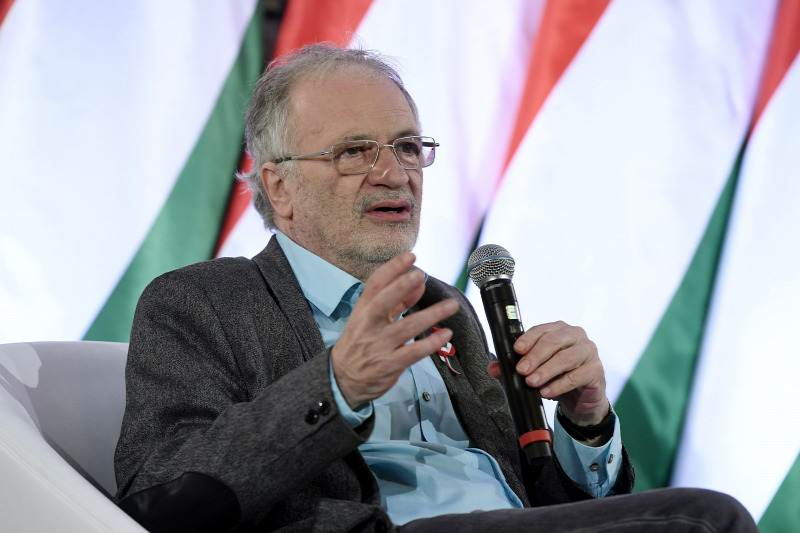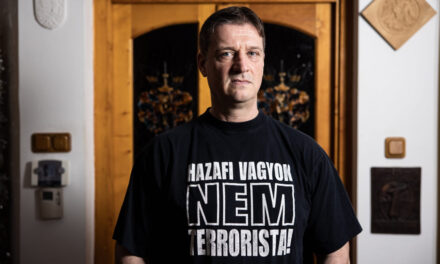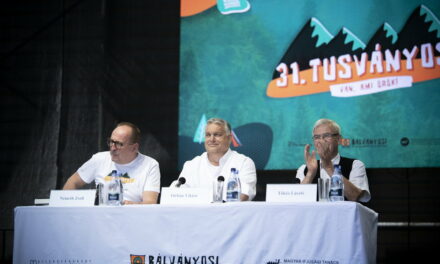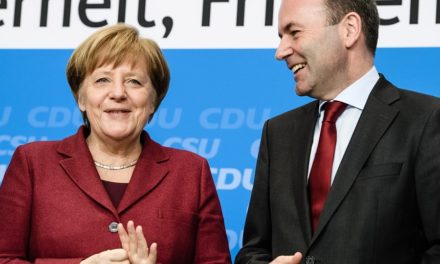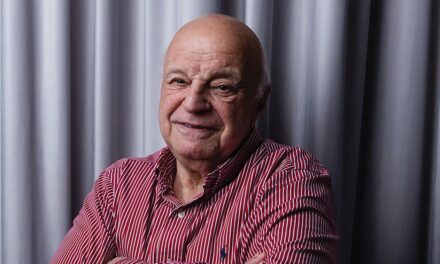Can a people fight collectively for freedom of thought, speech and opinion, for the rights of minorities and for international public law? And if so, are the "Ukrainian people" like that?
The news
On October 19, 2022, the news was published: the Sakharov Prize, donated by the European Parliament, will be awarded to the people of Ukraine . The EP statement quoted Roberta Metsola, the President of the European Parliament, who, at the body's plenary session in Strasbourg, announced the award as a justification: the award belongs to all those who fight on the battlefield, those who have to flee, those who have lost relatives and friends, those who stand up and they fight for what they believe in.
The brave Ukrainian people were nominated for the award by the European People's Party.
According to their reasoning, the Ukrainian people are worthy of the award because "against a brutal regime that wants to undermine our democracy and divide the European Union" on the battlefield, they are not only defending their home, autonomy, independence and territorial unity, but freedom, democracy, the rule of law and the also European values. In the justification, the role of Ukrainian President Volodymyr Zelenskyi, individuals, civil society initiatives, and state and other public institutions was highlighted. Special mention was made of the Ukrainian State Disaster Management Service, the founder of the Taira Angels evacuation medical unit, Yuliya Payevska, the president of the NGO Center for Civil Liberties, human rights lawyer Oleksandra Matviychuk, the Yellow Ribbon civil resistance movement, and the city currently under Russian occupation. Mayor of Melitopol, Ivan Fedorov.
The Ukrainian people were chosen from among three candidates. The other two candidates were Julian Assange, the founder of Wikileaks, and the Colombian Justice Commission. The prize is worth 50,000 euros.
The Sakharov Prize
The award is named after Andrei Dmitrievich Sakharov (1921-1989). Sakharov was a Russian nuclear physicist who became a member of the human rights movement organized in the Soviet Union in 1970, demanding the abolition of censorship, independent courts, and the enforcement of civil liberties. In 1975, he received the Nobel Peace Prize.
The idea of the prize arose in 1984 - when the European Parliament was discussing Sakharov's internal exile. French representative Jean François Deniau put forward the idea of the award. According to the original idea, the Sakharov Prize is awarded for the fight for the idea of freedom of thought and speech. At the end of 1985, the European Parliament accepted the establishment of the Sakharov Prize for freedom of thought. In 1987, Sakharov contributed to the creation of the prize named after him. After all, a wording was adopted according to which the Sakharov Prize is awarded to individuals and organizations who have made outstanding achievements in the field of human rights in Europe or anywhere else in the world. The Sakharov Prize has been awarded since 1988.
The regulations of the Sakharov Prize were amended in 2003 following the proposal of representative Elmar Brok. In addition to human rights, the representatives decided to emphasize the outstanding results achieved in the field of protecting the right to freedom of opinion, as well as the efforts for the rights of minorities and international public law. In general, activities aimed at establishing democracy and the rule of law were also included in the scope of the award.
Originally, nominations for the Sakharov Prize required the support of at least 25 members of parliament. After that, the Political Committee of the European Parliament presented 3 candidates to the presidency, which selected the winner of the award. Since 2003, parliamentary groups have also been able to nominate someone for the award. The task of the Parliament's Foreign Affairs Committee was to distribute 3 candidates to the so-called to the Conference of Presidents. (The Conference of Presidents consists of the president of the parliament and the leaders of the representative groups.) They chose the winner. After the number of members of the parliament increased over time, from now on a unanimous proposal of at least 40 representatives was required for nomination. The award originally amounted to 5,000 ECU (European Currency Unit), as there was no euro in 1988. Later, the amount of the award was increased and it gradually increased to 50,000 euros.
The amount can be measured by the fact that the 751 representatives of the European Parliament - without various allowances - earn a gross of 9,386 euros 29 cents per month. The President of the European Council earns a gross monthly salary of 32,700 euros, and the President of the European Commission earns a gross monthly salary of 29,205 euros 17 cents. The Sakharov Prize represents a little more than five months' gross salary for members of the European Parliament, one and a half months for the President of the European Council, and roughly 1.7 months for the President of the European Commission. What is too much and what is too little is a matter of judgement.
The winners so far
Many people and organizations have been honored with the Sakharov Prize since 1988. The awardees were not necessarily connected to European culture, but the point was that their activities serve the cause of freedom of speech, freedom of opinion, human and minority rights and the enforcement of international law, as well as democracy and the rule of law. Among the winners were quite a few who later won the Nobel Peace Prize. In 2019, the promenade of the Sakharov Prize winners was inaugurated on the Solidarity 1980 promenade in front of the European Parliament in Brussels. The promenade consists of 43 ceramic tiles that present the honorees.
In 1988, the first recipient was Nelson Rolihlahla Mandela, a committed fighter for the abolition of apartheid in South Africa, and - at the suggestion of Sakharov - the posthumous recipient Anatoly Marchenko, who spoke for political prisoners imprisoned in the Soviet Union.
The 2021 honoree, Alexei Navalny, the currently imprisoned Russian opposition politician, an opponent of Russian President Vladimir Putin,
who constantly speaks out against the repressive policies of the Putin regime.
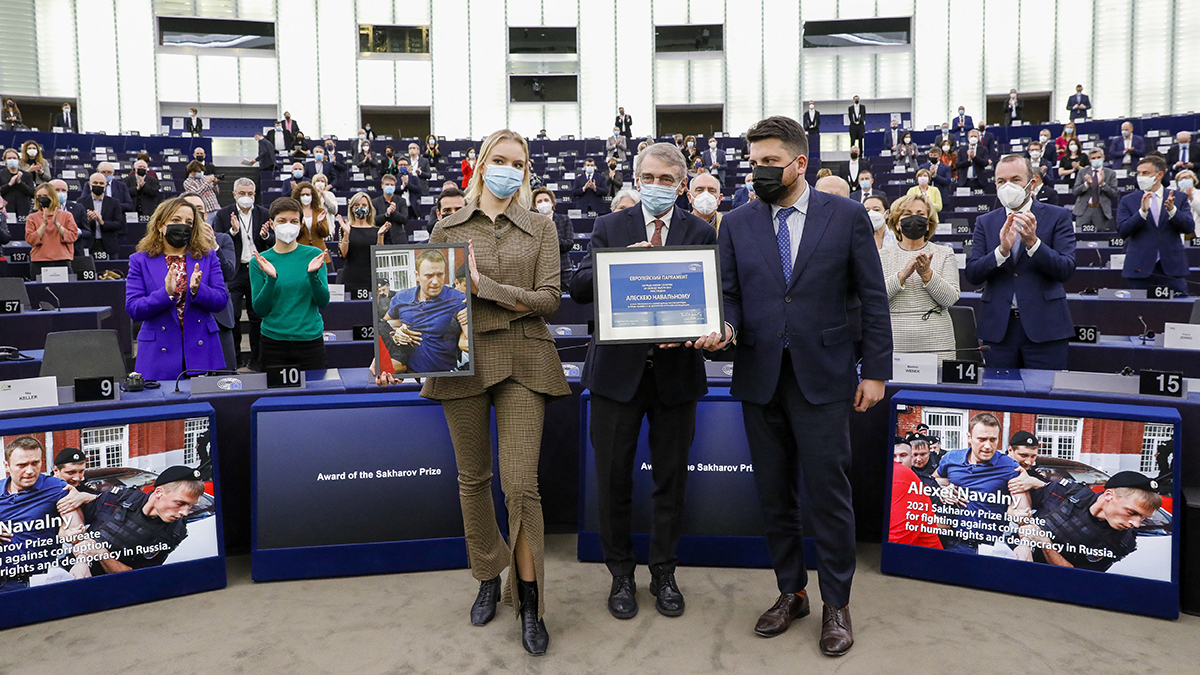
The daughter of Alexei Navalny with the Sakharov Prize. Photo: Julien Warnand/POOL/AFP
In the intervening time, the awardees included an economist who supported the Uyghurs, a Ukrainian film director imprisoned in Russia, a Congolese doctor helping victims of sexual violence, an Israeli and Palestinian human rights activist, a writer who fought against oppression in Saudi Arabia, who advocated for women's further education and against the Taliban. an outspoken Pakistani girl, a participant of the "Arab Spring" in Syria-Libya-Egypt-Tunisia, showing commitment to human rights, a Cuban political activist. But among the organizational awardees we can find Kofi Annan and the entire staff of the United Nations, who, according to the awardees, have also fought committedly to promote justice and human rights; Reporters Without Borders, an international non-governmental organization that persistently defends the rights of journalists and thus the value of freedom of expression; the May Square Mothers, who fought against the military dictatorship in Argentina at the time; the staff of the Oslobodjenje newspaper in Sarajevo, who spoke out during the Yugoslav War to preserve ethnic diversity; the Union of Belarusian Journalists, which defended freedom of speech in Belarus; the Russian Memorial Institution, which preserves the memory of the victims of Stalinist and Soviet terror in general; the Belarusian and Venezuelan democratic opposition. But the Cuban organization Asszonyok Fehérben, which demanded democracy in the island country, is also among the awardees.
In all cases, the circle of individuals and institutions awarded represents the original and modified content of the award.
Paradigm shift: the people
The history of the award so far has proven that the people involved received the award in line with the original values. It is the first time that all the values embodied in the prize have been awarded to a people who are believed to embody all that the prize stands for.
This raises intellectual and conceptually difficult questions.
Can a people fight collectively for freedom of thought, speech and opinion, for the rights of minorities and for international public law? Can a people fight collectively for democracy and the establishment of the rule of law? If he can fight, is this true for the Ukrainian people?
Of course, it is intellectually questionable from the outset whether a people can be considered homogeneous and unified in a political sense. This is especially true when a people, or more precisely the state that institutionally expresses the people, is waging a war of self-defense. Because in such cases, the respect for the rights of minorities tends to prevail the least, because the full respect of the rights of national and political minorities is subordinated to the national task of protection. So can we say that the state representing the Ukrainian people has unconditional respect for the rights of Russians or Hungarians living on its territory?
Can we say that the Ukrainian state fully respects and nurtures the rights of political minorities?
Is it possible that if a nation or its state is waging a self-defense war, then this period is a festive moment for freedom of thought and pluralism? Hasn't the Ukrainian leadership banned pro-Russian parties since the war?
Is the state of war a triumph of the rule of law? Are all rights respected by the fighting army and the civil administration? Isn't the logic of necessity and compulsion prevailing instead of law?
All peoples are divided politically, and so obviously the Ukrainian people too. Among the divided Ukrainian people, does not the one that manifests itself in a strongly nationalistic, or in some cases sympathizing with Nazi ideals, represent a marked trend? It is a general phenomenon that every war intensifies nationalist extremism.
Until now, whoever received the Sakharov Prize - be it a person or an organization - could be clearly identified politically. In my opinion, the Ukrainian people as a concept is a politically divided, non-identifiable category. The awardees certainly wanted to express their solidarity with the attacked Ukraine, which is why they gave the Sakharov Prize to the Ukrainian people. In my opinion, political goodwill has turned into conceptual and intellectual surreality. I don't consider it a coincidence that the Sakharov Prize has not been awarded to the people so far.
Now the politics of the European Parliament have completely overridden common sense.
Ferenc Kazinczy wrote in 1811:
»Good and good!
This is the big secret. If you don't understand this, Plow and sow; and leave the sacrifice to someone else.«
The European Parliament wanted good, but it did not want good well. That doesn't mean they have to go to plow and sow, but they leave the sacrifice to someone else. Anyway, they do that.
Featured image: MTI/Szilárd Koszticsák

